Drunken Panels Are at It Again
Why astronauts are banned from getting drunk in infinite
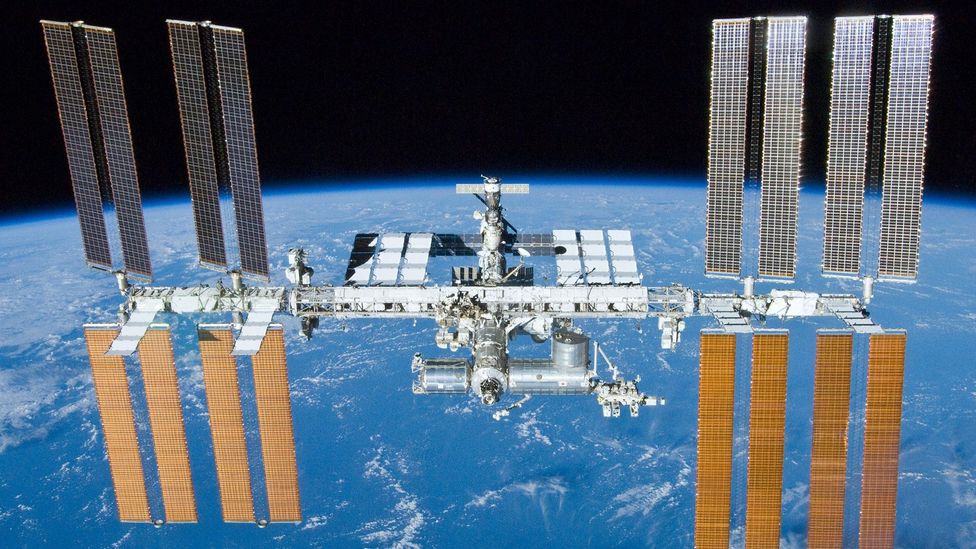
From wine being sipped on the moon to whisky on a infinite station, space travel has had a long and complex relationship with alcohol.
T
Travelling thousands of miles above the Earth, into the cracking inky unknown, is hard work. Information technology's stressful and scary. So why shouldn't astronauts treat themselves to an end-of-Earth-day cocktail to unwind?
Unfortunately for infinite explorers looking to wet their whistle, consuming alcoholic beverages is widely prohibited past the regime agencies that send them to places like the International Space Station.
Simply before long, everyday people might take their own gamble to venture out to the final frontier — in the form of civilian trips to explore and colonise Mars. Surely booze should be permitted on such a harrowing, ane-way trip that will accept years to consummate? Or at least equipment to ferment homebrewed beverages on the planet itself?
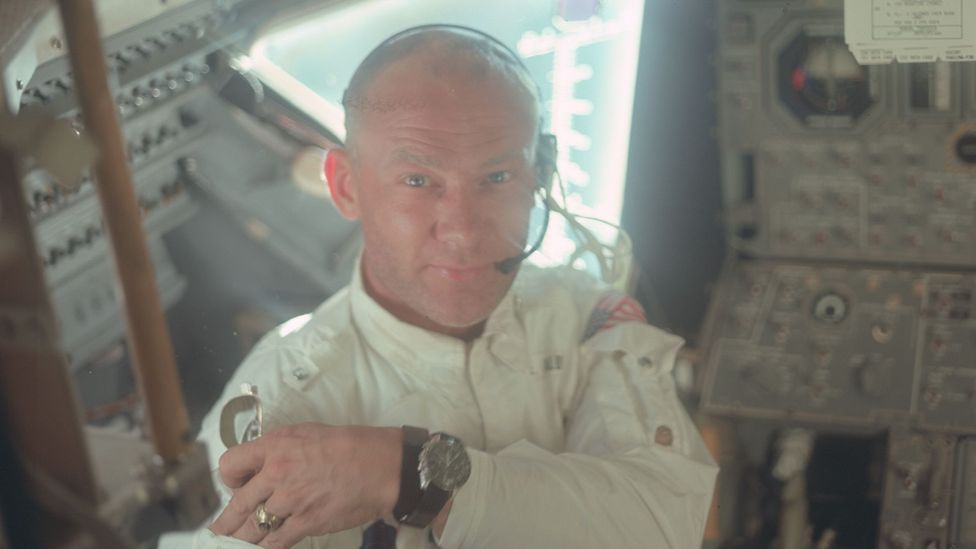
Fizz Aldrin may have been the 2d human being to walk on the moon, simply he was the first to drink wine there (Credit: Nasa)
The truth is, alcohol has historically had a complicated relationship with infinite exploration. Permit's take a look at what exactly could happen to astronauts who drink alcohol — and what might happen if we start sending more libations to humans in space.
At that place is a widely held belief that getting sloshed at higher altitudes makes you lot feel woozier faster. So it would seem logical to presume drinking alcohol while in orbit could have fifty-fifty more than bizarre effects on humans. Simply this notion may non really be true.
In fact, there is evidence that debunks this myth that dates back to the 1980s. In 1985, the United states Federal Aviation Administration conducted a study that monitored whether alcohol consumed at fake altitudes affected performances of complex tasks and breathalyser readings.
In the study, 17 men were asked to down some vodka both at footing level and in a chamber that simulated an altitude of 12,500ft (3.vii kilometres). They were and so asked to complete tasks including mental maths, tracking lights on an oscilloscope with a joystick, and a multifariousness of other tests. The researchers found "there was no interactive effect of booze and distance on either breathalyzer readings or performance scores."
So, is getting boozer faster while flight a myth? Dave Hanson, a professor emeritus of sociology at the State Academy of New York at Potsdam who has researched alcohol and drinking for over 40 years, thinks information technology is. "I can't imagine it would be any different [drinking in space]," he says.
He does think that altitude sickness could mimic hangovers, but it could also mimic intoxication. "If people aren't adequately pressurised, they tin feel intoxicated as well," he says.
Instead, people who claim to take got drunkard on a plane, in a fashion that's faster than normal, could just be experiencing the "recall-drink" effect, which has been studied extensively over the years. Information technology suggests that people are going to human action more boozer if they think they are drunkard — non if they've really been consuming booze.
"If people are flying on an airplane, and they think for whatsoever reason the alcohol is going to have a unlike effect on them, they will retrieve that information technology volition have a unlike effect on them," says Hanson.
So if at that place's no added concrete upshot, having a petty nightcap aboard the ISS shouldn't be a big deal, right? Wrong.
"Alcohol is not permitted onboard the International Space Station for consumption," says Daniel G Huot, spokesperson for Nasa'due south Johnson Space Heart. "Use of alcohol and other volatile compounds are controlled on ISS due to impacts their compounds tin can have on the station's h2o recovery system."
For this reason, astronauts on the infinite station are not even provided with products that contain alcohol, like mouthwash, perfume, or aftershave. Spilling beer during some drunken orbital hijinks could also risk dissentious equipment.
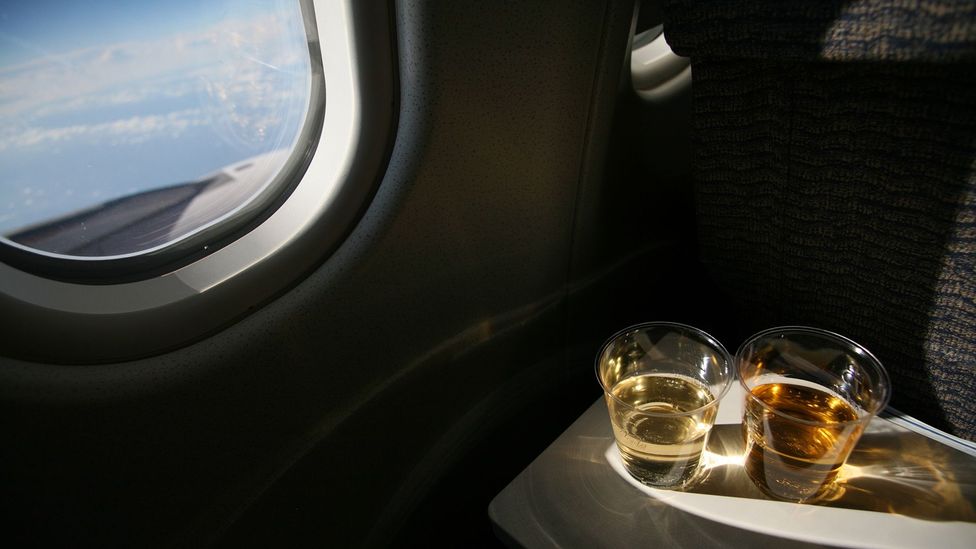
Tests suggest the old adage that drinking at distance while on aircraft flights increases the authorisation of alcohol is not actually truthful (Credit: iStock)
Then there is the issue of responsibleness. We don't permit motorcar drivers or jet pilots to be drunk and in accuse of their vehicles, so information technology is hardly surprising the same rules utilise to astronauts inside a $150 billion space station travelling through a near vacuum at 17,200mph.
Yet, back in 2007, an independent panel set up by Nasa to look into the wellness of astronauts stated in that location had been at least two astronauts in the agency'south history had consumed heavy amounts of alcohol in the immediate pre-flight period, merely were still permitted to wing. A subsequent review by Nasa's caput of condom could discover no evidence to substantiate the claims. Astronauts are strictly prohibited from drinking 12 hours before flying equally they require total presence of mind and awareness.
The reason for the rules is articulate. In the same 1985 FAA study on the effects of booze at distance, the researchers ended that every piffling bit counts. Regardless of the altitude the subjects drank at, breathalyzer readings were the same. Their performance was too equally impaired, simply those who had a placebo at altitude performed worse than those who had a placebo at bounding main level. It suggests that altitude, regardless of booze consumption, tin can have a slight effect on mental performance. The written report concludes this "serves to reduce further whatever margin of rubber remains in performance skills following alcohol ingestion".
There could be another reason to avoid frothy drinks like beer – without the help of gravity, liquid and gases can tumble effectually in an astronaut'southward stomach, causing them to produce rather soggy burps.
Notwithstanding, despite the strict rules, it does not hateful that humans in space never come into contact with fermented liquids. At that place have been plenty of experiments aboard the ISS that involve booze — only nothing involving extensive human consumption, so no one really extensively knows how the human trunk would react.
"We practise study all sorts of ways astronauts' bodies change in space, including at the microbial level," says Stephanie Schierholz, Nasa's Press Secretary. "And we have a very robust diet programme to ensure their bodies get what they demand to stay healthy. Patently for the Skylab programme, they considered sending sherry with the astronauts, but it didn't test well on the cypher-K flights."
Schierholz adds the sherry used in the tests "prompted gag reflex, and the public also objected."
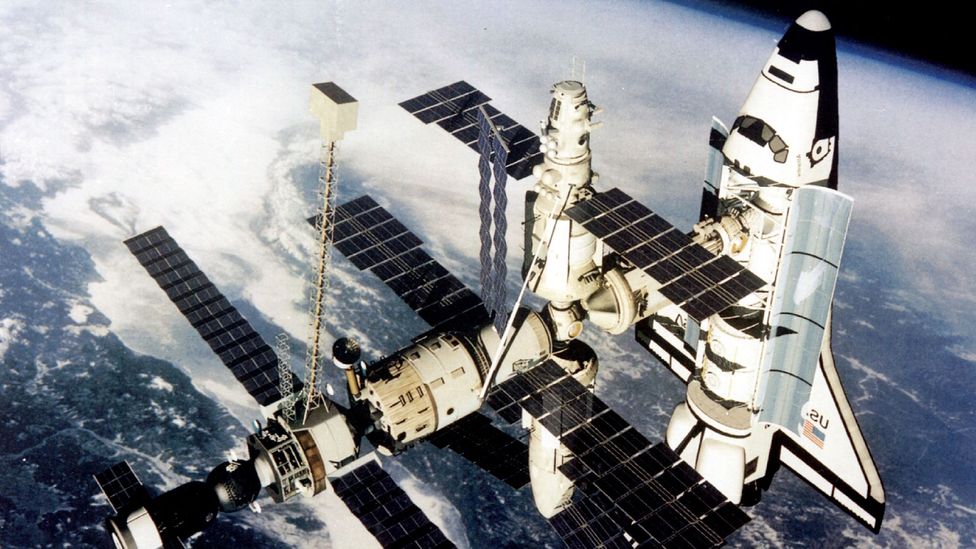
Cosmonauts onboard the Russian Mir Space Station were apparently allowed small amounts of cognac (Credit: Getty Images)
The odd tipple, however, does nevertheless find its mode onto the ISS. In 2015, Japanese brewer Suntory — which has its own Global Innovation Center — shipped some of its award-winning whisky to the space station. It was office of an experiment aimed to monitor "development of mellowness in alcoholic beverages through the employ of a microgravity environment". In other words, the mode booze ages in microgravity could be different, causing it to sense of taste better, faster. And that'south something every distillery on Globe would want to learn more than about.
And a few years before, from September 2011 to September 2014, Nasa sponsored an experiment that studied microgravity'south effect on whisky and the charred oak wood that aids in the aging procedure. Later nearly 1,000 days in space, the tannins in the whisky remained unchanged — just the infinite woods chips yielded higher concentrations of flavour-imparting lignin breakdown products.
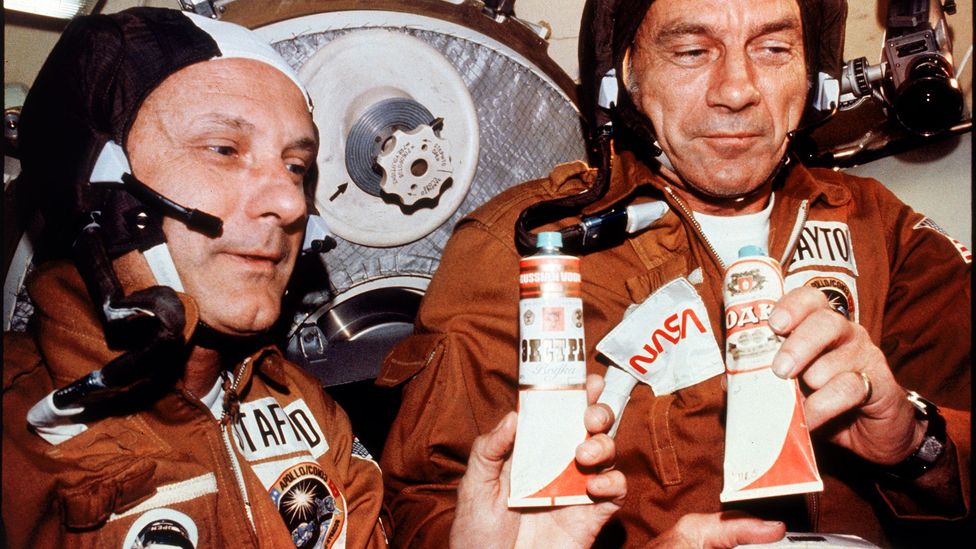
In 1975 American astronauts Tom Stafford and Deke Slayton were presented with tubes apparently holding vodka during an Apollo/Soyuz link-upward (Credit:Nasa/Getty Images)
"This observation has implications for not simply the malt whisky industry, just those of the food and drinks industry in general," Nasa remarked. "The difference in flavor betwixt the ISS and control samples is then marked, that further assay is needed to decipher the creation of the different flavors."
And so even though astronauts are banned from drinking booze themselves while in orbit, the work they are doing could improve the quality of alcohol for consumption dorsum here on state.
With missions to Mars that will meet humans away from home for years rather than months, there could at present be an statement to relax some of the rules on drinking.
Experts like Hanson, withal, see no harm in standing to prohibit alcohol. Beyond the practical condom concerns, there could exist other challenges. Hanson thinks that Earthlings' many socio-cultural differences, flaring upwards in tight quarters for years on end, volition make boozing trickier, also.
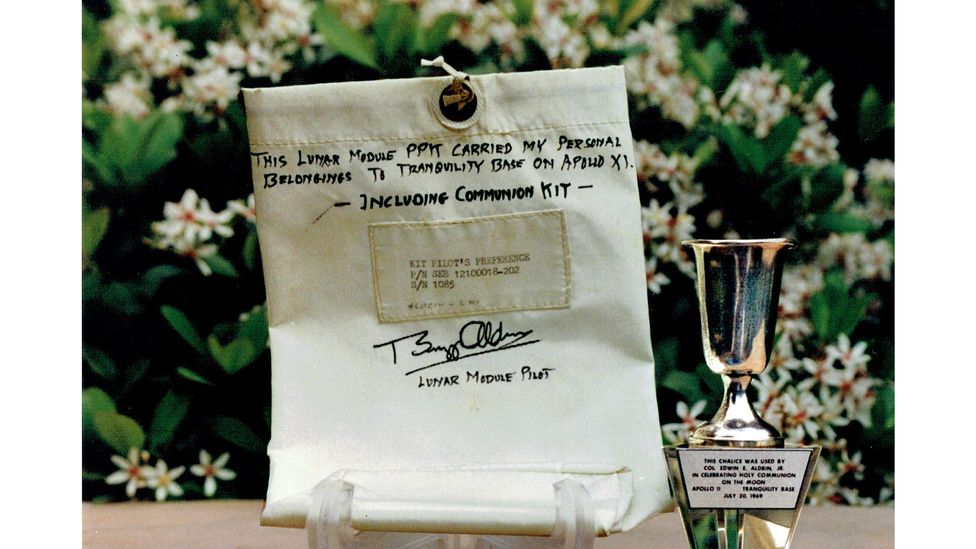
Aldrin's communion cup made its way back to Earth (Credit: David Frohman/Peachstate Historical Consulting Inc)
"Information technology's a political thing. It'due south a cultural matter. It'south non a scientific thing," he says. "It would be a potential area of conflict, because of people'due south cultural backgrounds, they'll see it differently." What if you're sharing quarters with Muslims, Mormons, or teetotallers? Harmonising cultural viewpoints in confined spaces for a guaranteed indefinite corporeality of time is something that needs "to be ironed out early," Hanson posits.
And so, information technology seems that astronauts will have to settle for lifting their spirits by enjoying the view out of the window rather than indulging in hard spirits while in orbit. It will be up to those of usa left backside to make certain a proper amount of champagne is set up and awaiting to toast their homecoming.
--
Go along up to date with Future stories past joining our 800,000+ fans on Facebook , or follow us on Twitter , Google+ , LinkedIn and Instagram .
If you liked this story, sign up for the weekly bbc.com features newsletter , called "If You Simply Read half-dozen Things This Week". A handpicked selection of stories from BBC Futurity, Globe, Civilization, Capital and Travel, delivered to your inbox every Friday.
andersonbremandes.blogspot.com
Source: https://www.bbc.com/future/article/20170217-why-astronauts-are-banned-from-getting-drunk-in-space
Enregistrer un commentaire for "Drunken Panels Are at It Again"